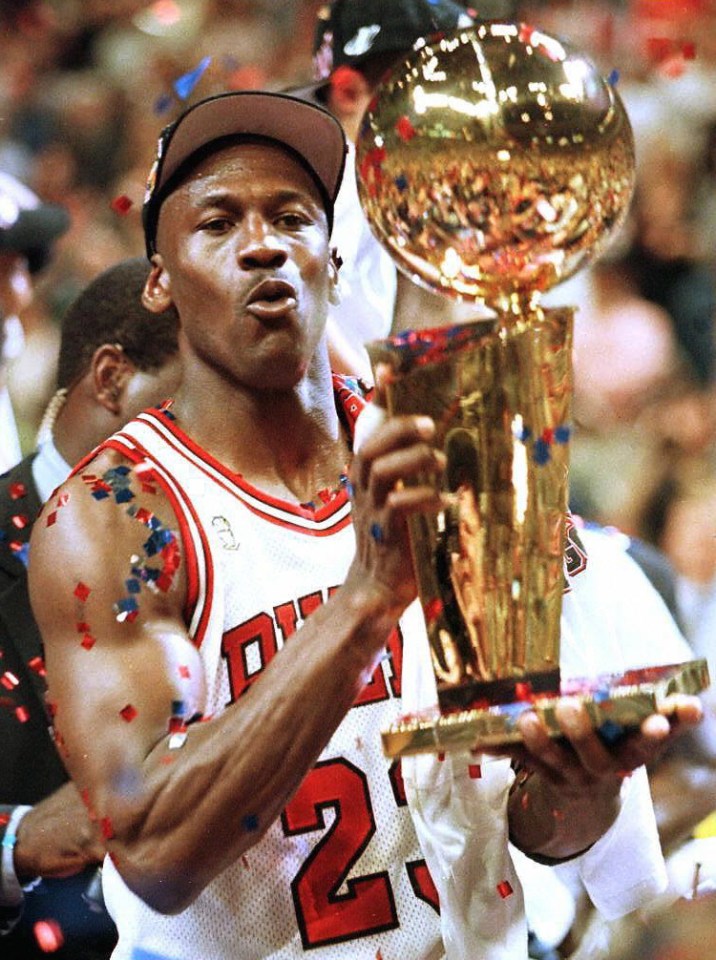Michael Jordan’s love of gambling is the stuff of legend.
The six-time NBA champion was fiercely competitive and had a win-at-all costs mentality, both on and off the court.

However, MJ always maintained that he had a “competition problem” rather than a gambling problem.
Jordan never took it easy on his friends and colleagues, as seen in hit Netflix documentary ‘The Last Dance’ when he competed against — and lost to — Bulls security guard John Michael Wozniack in a coin toss game.
Jordan once took $17,000 off a Bulls teammate in cards, who was forced to call up his wealthy father to lend him money so he could pay back the debt.
While cards may have been Jordan’s most frequent form of gambling, golf was his most expensive.
In May 1993, a golfing partner of Jordan’s named Richard Esquinas released a book entitled ‘Michael and Me: Our Gambling Addiction… My Cry for Help.’
In the book, Esquinas alleged that Jordan ran up more than $1.2 million in golf gambling debts. Jordan later denied those claims and the sum was apparently never paid in full.
However, Esquinas later revealed that Jordan and him eventually agreed upon settling the debt at $300,000.
That same year, Jordan shocked the world by announcing his retirement from basketball to play baseball, citing “physical and mental exhaustion”.
Jordan was at the peak of his powers and coming off a historic three-peat with the Chicago Bulls. His retirement was so out of the blue that many at the time suspected foul play.
Conspiracy theorists went into overdrive and speculated that MJ’s 1993 retirement was actually a secret suspension from the league for gambling.


They followed a story written by Mark Whicker of the Orange County Register that suggested a connection between Jordan’s gambling debts and the death of his father, James Jordan, in 1993.
Former NBA Commissioner David Stern categorically denied those rumors and they have since been debunked.
Then ESPN columnist Bill Simmons sat down with Stern around that time, who laughed off the theory.
Simmons wrote: “His [Stern’s] famous sarcasm lurks just around the corner.
“Like his tongue-in-cheek reactions to some of the classic conspiracy theories, including… how MJ’s baseball career was a result of Stern’s bringing MJ to his house to suspend him for gambling.
“‘In my living room!’ he adds, shaking his head. ‘My wife still wants to know where she was that day’.”

Two years later, renowned New York Times sportswriter George Vecsey wrote: “David Stern says there was no secret suspension for gambling, and I believe the NBA’s commissioner.
“You can’t hide something like that.”
In 2010, Ron Shelton, director of ESPN ’30 for 30′ documentary ‘Jordan Rides the Bus’, revisited the rumor that Jordan first retired from the league in 1993 to play baseball because of his heavy involvement in gambling.
Shelton said that he began working on the documentary believing that the NBA had suspended MJ for that reason, but subsequent research “convinced [him it] was nonsense”.
He said he found no reason to believe the NBA quietly punished Jordan for a year because of gambling.
“I probably, like most people in America, thought he left the NBA for a year because of gambling,” Shelton said.
“After researching the project, I was utterly convinced that was nonsense. And probably like most people, I thought he was a catastrophically bad baseball player. And after researching it, I got a different view about that, as well.”

After retiring to play baseball, Jordan returned to the Bulls in March 1995 and led them to three more championships in 1996, 1997, and 1998.
In doing, he became the consensus greatest basketball player of all time, and his love of gambling was more than an interesting footnote in the life of the basketball GOAT.
Billionaire MJ was ultimately able to incur any losses in golf or cards by virtue of his staggering net worth.
To Jordan, gambling was nothing more than a hobby that enabled him to quench his competitive thirst when he wasn’t winning NBA championships
Even so, No. 23 himself admitted that he made reckless decisions in gambling when discussing his expensive pastime with Ed Bradley of 60 Minutes in 2005.
Jordan stated: “Yeah, I’ve gotten myself into situations where I would not walk away and I’ve pushed the envelope.
“Is that compulsive? Yeah, it depends on how you look at it. If you’re willing to jeopardize your livelihood and your family, then yeah.”



